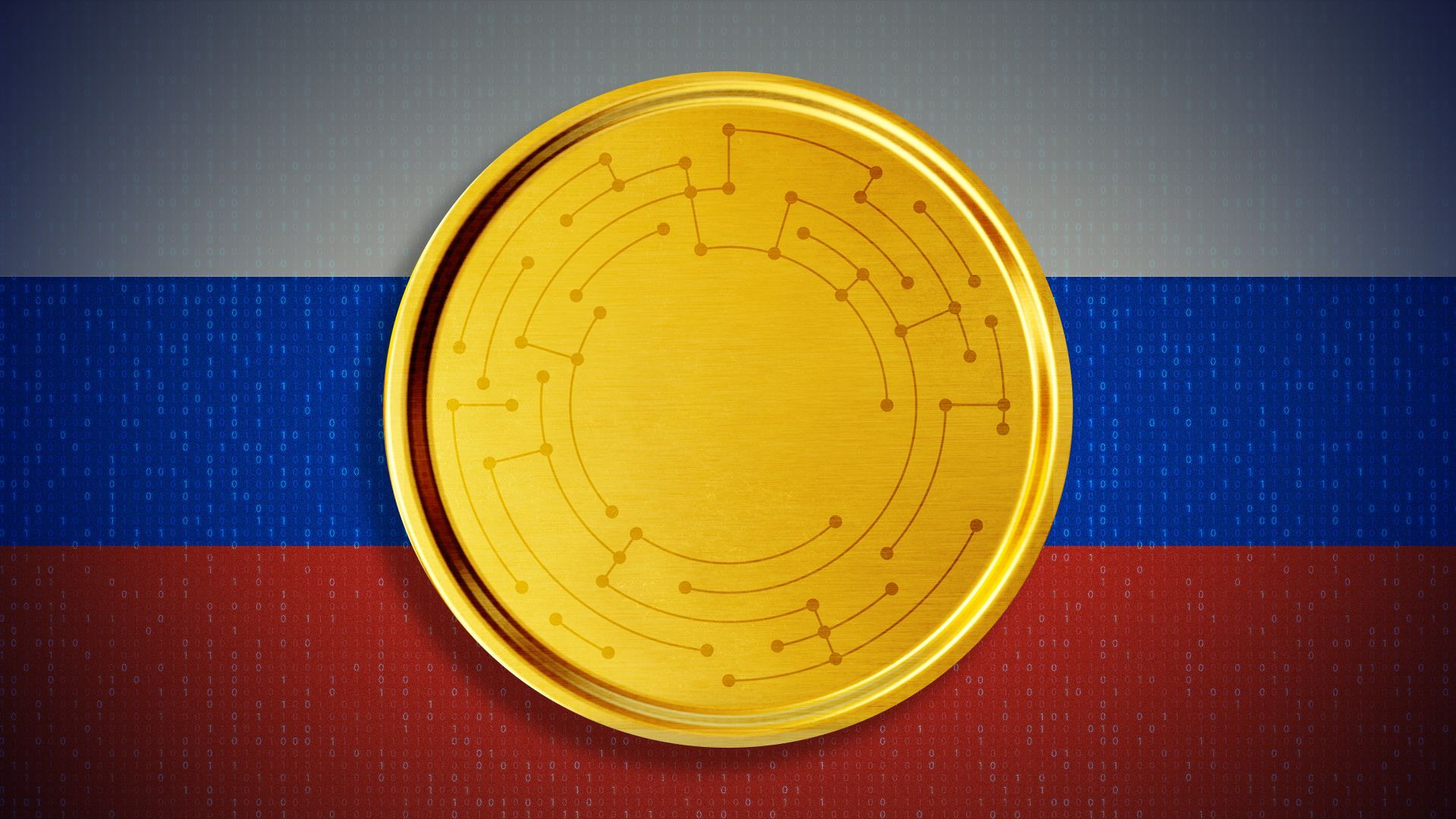Ukraine crisis puts D.C. crypto lobby in hot seat
Add Axios as your preferred source to
see more of our stories on Google.

Illustration: Shoshana Gordon/Axios
Russia's invasion of Ukraine is highlighting the dark side of crypto, right as the industry's lobby ramps up efforts in D.C. to protect it from regulation.
Why it matters: The crisis provoked a sharp and nearly united response globally from the very institutions — governments and banks — that cryptocurrencies seek to sideline. It's also amplifying the perception that crypto helps bad actors escape penalties or detection.
- At the same time, the war's pressures are pushing even more people to begin using crypto.
What’s happening: Sanctions speedily imposed by governments and traditional banking systems after Russia’s Ukraine invasion helped tank Russia’s economy.
- Immediately, concerns arose that both the Russian government and targeted individuals might sidestep sanctions by funneling money into decentralized, unregulated cryptocurrencies.
- A group of four senators, including Sen. Elizabeth Warren (D-Mass.), wrote to the Treasury Department Wednesday asking whether “criminals, rogue states, and other actors may use digital assets and alternative payment platforms as a new means to hide cross-border transactions for nefarious purposes.”
- Additionally, the Biden administration asked leading crypto exchanges to monitor accounts that might be tied to sanctions targets.
- Crypto platforms have balked at calls to ban Russian addresses from using their services.
The intrigue: The crisis unfolded just as crypto lobbyists in D.C. were cranking up a campaign to dissuade lawmakers from enacting new restrictions.
- “Congress blindsided the industry last summer with tax provisions in the infrastructure bill, and advocacy ramped up exponentially and immediately,” Niki Christoff, a Beltway consultant who advises companies in the crypto payments space, told Axios.
By the numbers: A cryptohead.io study, released last month, showed that the industry's lobbying expenditures increased by 116% in 2021, rising to $4,925,000.
- A Tech Transparency Project report released at the end of last year revealed at least "235 officials from Congress, the White House, federal agencies, the Federal Reserve, and national political campaigns" have "moved to or from dozens of crypto companies, exchanges or trade associations..."
- Membership in the Blockchain Association lobby group has ballooned in recent months to 80 members, including Crypto.com and Foundry Digital.
The big picture: Cryptocurrencies and blockchain-based tech aim to build alternatives to existing financial systems that can transcend national boundaries and operate beyond government reach.
- That vision has increasingly conflicted with real-world institutions and laws.
- The dramatic rise in ransomware attacks, often coupled with demands for payment in crypto, has added to regulators’ fears.
- "In reality, the crypto industry has the worst of both worlds: dependence on institutions without any of their protections," crypto critics Rebecca Ackermann and Poppy Alexander wrote in an LA Times op-ed on Monday. "No wonder terrorists increasingly rely on crypto for financing, criminals seek to hide their funds with it, and fraudsters take advantage of the gullible, with crypto 'love scams' particularly on the rise."
Yes, but: The Russian invasion has also added weight to some arguments in support of crypto.
- Crypto has proven a fast and effective way to send funds to the war zone. The Washington Post reported on Thursday that the Ukrainian government has already raised over $42 million in crypto.
Inside the industry, many, like Christoff, say that concerns crypto might help Russia evade sanctions are a “red herring.”
- "People can’t spend crypto without off-ramps into fiat banking,” Christoff said.
- And some have pointed out that the magnitude of the sanctions, paired with the transparency of public blockchain receipts, would make it difficult for Russia to use crypto as a financial back door.
Between the lines: Dave Grimaldi, executive vice president and head of government relations at the Blockchain Association, understands how quickly the tide can turn against a new, technologically complex industry.
- “You're always one crisis away from good will eroding within minutes,” he said. “Look at the examples involving data breaches, car emissions disclosures, health care cover ups, on and on.”
- “Crypto's unfamiliarity, relative ‘newness’ and complexity have elected officials, especially Democrats, skeptical and leery," he adds.
